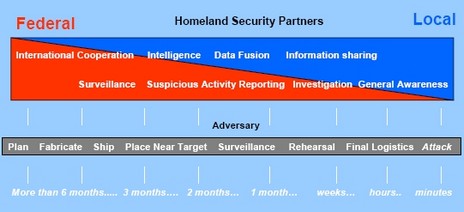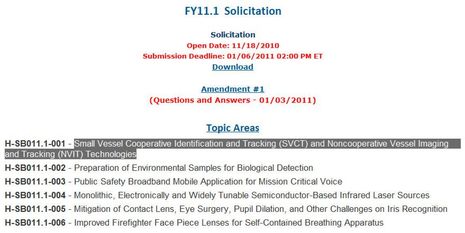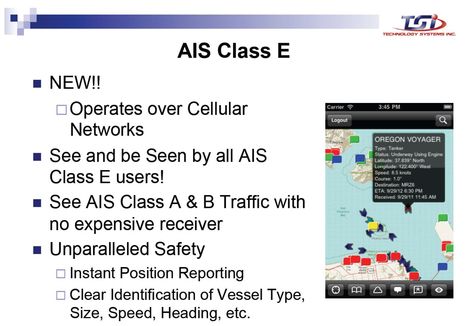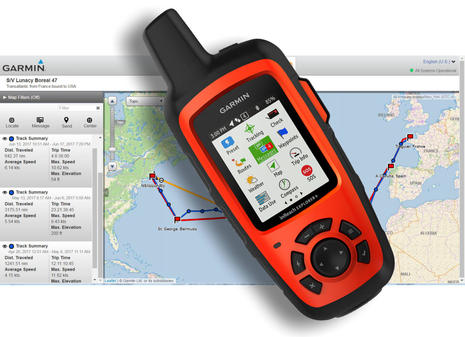RFIDs for DHS, AIS later?

“The nation’s 18 million recreational boaters may need to register their crafts in a national database and place radio frequency identification tags {RFID} on their vessels under plans put forth by a stakeholders group convened by the Homeland Security Department {DHS}.” So says an article in WashingtonTechnology. The idea, um, doesn’t sit well with the editor of Sailing Anarchy, who described it today as, “an example of what the some of the jackals at ‘Homeland Security’ think fighting the ‘war on terror’ is about…This is a pathetic joke, a national embarrassment and an outrage that this is what the Bush government is up to.”
I have a different take. Last year at the Miami Boat Show I heard a USCG Rear Admiral speak very convincingly about how dangerously “soft” and vulnerable our ports are, and how the Guard wanted all parties—including recreational boaters—to help figure out better ways to secure the waterways. His talk was a prelude to the National Small Vessel Security Summit (NSVSS), which issued a full report just recently. Here’s an IBI synopsis, and you can download the whole 122 page PDF from the NSVSS home page (it’s 2.6 Megs, not 8 as stated). The RFID story came from this report, and it relates to AIS. I know some skeptics think that DHS wants AIS so it can watch us all “big brother” style, but that didn’t seem important to the Rear Admiral, nor is it high on the report’s suggestion list:
Domain Awareness: AIS technologies should not be required for vessels under 65 feet in length until the technology is perfected, the cost of such technology significantly reduced, and until law enforcement has the ability to track and respond to all vessels in the maritime domain. Until these problems are resolved, an interim step may be for small vessels to install some type of RFID technology or install relatively inexpensive vehicle recovery and monitoring systems similar to LoJack or OnStar… Whatever tracking system is adopted it must be simple, effective, inexpensive, and multipurpose.
Of course it’s doubtful that the government will enact regulations to deal with waterway security any time soon. Heck, the USCG sent its Class B approvals up to the FCC a year ago—for collision avoidance now and maybe MDA (Marine Domain Awareness) eventually—and they’re still not approved. So what if there was a terrible act of terrorism involving the use of, say, a 25’ I/O like my Ralph? I suspect the Rear Admiral was correct when he suggested that the result might be truly Draconian regulations, like prescribed coastal routes, shoved down our throats fast. It’s a worry.
Besides understanding the Guard’s predicament, it seems like the best thing you can do now is to check out the America’s Waterway Watch program, and call 877-24WATCH if you see suspicious activity. (Yes, I realized that a curious gunk-holing photographer like me may fit the “profile”, but I’m willing to endure the hassle if it helps keep the waterways free.)













Interesting that DHS uses 877-24WATCH. I just went to put this in my cellphone and there are no letters on the number keys. If I didn’t have a landline phone here at my desk, I’d never get the correct numbers and yet 99% of the time the calls should come from a cellphone. FWIW, try 877-249-2824.
Security folks are not the sharpest knives in the drawer. This really sounds like a diversionary tactic by the bad guys to keep the security forces focused elsewhere. Create more paperwork….these guys are like an old broken gun, they don’t work, and you can’t fire them.
With the billions we have spent on homeland security, I do not recall any terrorist being arrested. Before homeland security, the customs agents caught a terrorist from a tip by the mounties.
In summary this is really dumb, just from an operational point of view. I can hardly wait to see what happens when they realize aids to navigation may assist terrorist crossing our borders.
Pat Harman
The so called war on terror is totally bogus.
Can you see the arab landing party now as the over run our shores and subjugate us to the will of Allah! hahahaha
The threat is from the fascists inside this country. They are the ones who want to take all they can get and keep us silent and scared.
I fully agree with both Pat and Anonymous.
Additinally, the DHS can’t even manage a database of MMSI’s today, having spread the task across everything from NOAA (EPIRBs) and BOAT US (VHFs) to the FCC (ship station MMSIs). However, in keeping with Anonymous’ comments, an incompetent government is sometimes better than a competent one. The Nazi’s kept excellent records at the death camps.
In any case, more American’s drown each and every year than were killed on 9/11 and I don’t hear any calls for a national swimming lessons program. The “war on terror” has become a very profitable business for too many people.
Anonymous- what a truly stupid post. Do you remember the USS Cole? Probably not, or you wouldn’t have made such an ignorant comment. If you don’t think that radical Muslims could pack enough explosives into a 30′ boat to kill a bunch of Americans on a ferry you are very wrong. I’m not in favor of tracking every recreational boat out there, but that doesn’t mean the threat doesn’t exist.
Er, so the terrorists are not supposed to be smart enough to figure out how to turn off their RFID or LoJack system just before they head their dinghy into a restricted area? Are they planning to have a “check box 1.B if you are a terrorist” box on the application form? Whoever came up with the idea that IDng small boats has any meaning at all has not seen Puget Sound in the summer — with thousands of small boats not too far away from navy vessels being worked on.
This is one of a number of areas where the threat of terrorism is used to justify further encroachments on civil liberties and the federal budget. Tracking systems do nothing to stop terrorism, most of the terrorists are law abiding people until they decide to commit their crime.
If anything such a system can lead to a false sense of security. The 9/11 hijackers were smart enough to turn off the transponders in their hijacked aircraft, which made the planes invisible to ground control (they were flying below radar in at least one case.)
The problem with counter terror is that you are always creating a Maginot line. Whatever system that you put in place at the cost of billions of dollars and hundreds of hours of wasted time is going to be designed by a human — and it can be defeated by a human. It is not the same as deterring crooks by increasing the probabilty that the bad guy gets caught — someone willing to die for their sick cause isn’t going to be particularly deterred by going to prison or paying a fine for having an unregistered boat/disabled transponder or whatever it takes.
The main thing is that there are really not that many terrorists out there who want to get us. Overreacting by putting ID tags on every citizen (or at least every boating citizen) is probably what they want. If you want to see what a real terror war looks like, look to Britain during the time of the IRA. There are a lot of simple ways for terrorists to wreak havoc that cannot be deterred by an expensive technology system. Two guys with guns shut down much of the northeast (DC sniper.) The Hertz truck that Terry McVeigh blew up in Oaklahoma probably had all sorts of tracking systems installed.
Hey Ben, remind me not to start a War on Terror thread at Navagear, would ya? Thanks.
Oh, who am I kidding, I love this stuff!
The phrase is “Security Theatre”.
“It doesn’t have to make sense – we were just told to Do Something!”
Creating the Deparment of Homeland Scrutiny was a blunder of monumental proportions, unfortunately the first of a long line of even more staggering blunders responding to 9/11.
harumph
Wow, I was going to comment on how wacky the opinions were over at Sailing Anarchy, until I saw some of the responses here.
All USCG wants is to facilitate tracking small vessels in sensitive areas; transponders/AIS would also aid in SAR responses.
Before the libertarians take to the barricades, consider that the US is one of the few industrialized nations with NO mandatory licensing for boaters. I.E. any idiot can purchase a boat and go out to kill himself & others.
Let alone the number of people who might take a couple bucks to teach a class or carry folks around on a powered vessel w/out bothering to earn a USCG ticket. And boating safety/seamanship in the US has historically been a joke; hence the saying down in the islands, “Don’t anchor next to Americans.”
More easily tracking recreational boats will not only increase boating safety, but also may have a impact on public safety in general. 9/11 was over 6 years ago; time to get with the program, guys.
Notwithstanding the political issues, the technological content of this proposal fails to meet the test of reason.
RFID devices are for all intents and purposes, transponders. They provide a burst of information when pulsed with power or active response (from powered ones) when queried.
For them to have value in an interdiction scenario whether counter terror, theft recovery, or emergency response, power and antenna requirements put these devices in a cellphone or larger package at the very minimum.
Lojack (TM) is not a sticky James Bond button stuck to a bumper. It is a substantial comms device hidden — beyond economical (in terms of time and money) attempts to discover, and it operates in an antenna rich environment which lowers its output power requirements.
For RFID technology to do what the DHS would like, it is not going to be a trivial installation. It won’t be a mere slip of technology stuffed between the pages of a boat’s logbook.
Consider for a moment the windshield mounted RFID devices for managing tollway transactions. The range on these devices is about 10 meters.
For a device with a 1000 meter range (2 mins at 18 knots)– barely meeting the need for SA (10000 would be better, 100000 even more so) the form factor and power requirements will be significant enough that these will not be discretely hidden away systems that can give security forces a leg up.
In fact, they will be dumbed down AIS units. Maybe not on VHF, maybe with much less data content. So if we are going to be forced into a surveillance society such as the United Kingdom’s, I’d just as soon get some personal value from the unit.
The above is the 1st analysis in this thread which actually made any sense (beside Ben’s.)
The Lojack analogy is important for its differences from what I understand USCG wants from this system.
It need not be hidden from disabling, since any vessel not responding to an RF interrogation would essentially be announcing “Board me!” if detected by viz/radar.
Even if the environment is less antenna rich, the signals would carry farther over water, esp in low inshore sea states & will also be interrogated at high aspect angles using aircraft.
One other thing, guys: USCG is already monitoring you thru VTS & other camera systems in major harbors! See here: http://www.youtube.com/watch?v=tPiwL9nARew
Time to break out your tin-foil hats!
Fast speed boat on collision course:-
DHS options
RFID positive = Patriot approaching to say hello.
RFID positive = Terrorist in stolen boat
RFID negative = Terrorist who can’t steal a boat
RFID negative = Patriot with faulty tag.
Hell! He’s approaching, blow him out of the water anyway!
Hush up you guys, this may get us AIS B! or not.
I can’t think of any reason I don’t want the Coast Guard to know where I am. Can you? I’m over 21, and I haven’t stolen anything (big,) (lately.)
I just dropped another nice-ish comment on the FCC site, We’ll know tomorrow if it gets added to the 139 old ones, but since there’s a fresh posting from the Maritel *attorney*, it should.
Don’t send emails to the Commission Members today, the FCC’s intermediate mail server is down. This again from those who presume to regulate a technology they have not mastered.
And what’s to keep the ever elusive “bad guys” from simply stealing any old boat they please,say for example the local police or fire boat?
For any plan that attempts to control access or movement of people and equipment there is always a way to thwart it. Then there is the effect that people begin to think that the system will weed out the trouble makers so they lose personal awareness to a machine. Nothing is gained in security and much is lost in personal freedom.
I am surprised how easily folks can be persuaded to relinquish the very freedom everyone claims to be fighting to protect. The perpetrators of 911 did it using the most controlled vehicles on the planet, commercial airliners.
As Pogo said “we have met the enemy and he is us”